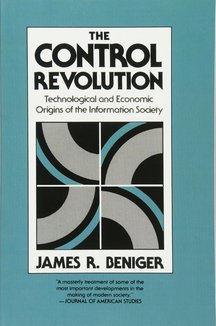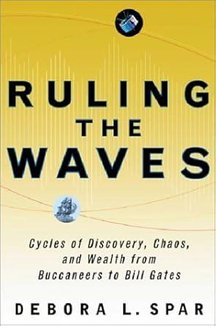Recommended Books

The Control Revolution: Technological and Economic Origins of the Information Society
Author:
James R. Beniger
ISBN 13:
978-0674169869
Why do we find ourselves living in an Information Society? How did the collection, processing, and communication of information come to play an increasingly important role in advanced industrial countries relative to the roles of matter and energy? And why is this change recent―or is it? James Beniger traces the origin of the Information Society to major economic and business crises of the past century. In the United States, applications of steam power in the early 1800s brought a dramatic rise in the speed, volume, and complexity of industrial processes, making them difficult to control. Scores of problems arose: fatal train wrecks, misplacement of freight cars for months at a time, loss of shipments, inability to maintain high rates of inventory turnover. Inevitably the Industrial Revolution, with its ballooning use of energy to drive material processes, required a corresponding growth in the exploitation of information: the Control Revolution. Between the 1840s and the 1920s came most of the important information-processing and communication technologies still in use today: telegraphy, modern bureaucracy, rotary power printing, the postage stamp, paper money, typewriter, telephone, punch-card processing, motion pictures, radio, and television. Beniger shows that more recent developments in microprocessors, computers, and telecommunications are only a smooth continuation of this Control Revolution. Along the way he touches on many fascinating topics: why breakfast was invented, how trademarks came to be worth more than the companies that own them, why some employees wear uniforms, and whether time zones will always be necessary. The book is impressive not only for the breadth of its scholarship but also for the subtlety and force of its argument. It will be welcomed by sociologists, economists, historians of science and technology, and all curious in general.

Ruling the Waves: Cycles of Discovery, Chaos, and Wealth, from the Compass to the Internet
Author:
Debora L. Spar
ISBN 13:
978-0151005093
From pirate Jean Lafitte's exploits on the high seas to Rupert Murdoch's creation of a media empire, this intriguing look at the frequently rocky path of innovation ranges from the first idea and development of an invention to their rise to market dominance. 50,000 first printing.

Orality and Literacy (New Accents)
Author:
Walter J. Ong
ISBN 13:
978-0415538381
Walter J. Ong’s classic work provides a fascinating insight into the social effects of oral, written, printed and electronic technologies, and their impact on philosophical, theological, scientific and literary thought. This thirtieth anniversary edition – coinciding with Ong’s centenary year – reproduces his best-known and most influential book in full and brings it up to date with two new exploratory essays by cultural writer and critic John Hartley. Hartley provides: A scene-setting chapter that situates Ong’s work within the historical and disciplinary context of post-war Americanism and the rise of communication and media studies; A closing chapter that follows up Ong’s work on orality and literacy in relation to evolving media forms, with a discussion of recent criticisms of Ong’s approach, and an assessment of his concept of the ‘evolution of consciousness’; Extensive references to recent scholarship on orality, literacy and the study of knowledge technologies, tracing changes in how we know what we know. These illuminating essays contextualize Ong within recent intellectual history, and display his work’s continuing force in the ongoing study of the relationship between literature and the media, as well as that of psychology, education and sociological thought.